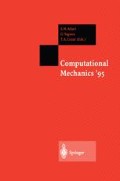Abstract
Statistical fracture mechanics includes models of both instantaneous and slow crack growth. The instantaneous crack growth models yield criteria of crack instability, the slow crack growth models result in probabilistic estimates of times to failure. A short reference to models both types is presented below. These models are not sufficiently ‘user friendly’ yet. In particular, an essential question of experimental evaluation of the fracture parameters introduced there appears to be buried in the formalism. In this paper, we list several non-conventional fracture parameters, their definitions, and some of the experimentally observable statistical distributions which contain them. Reference to “observable” (or ‘macroscopically observable’) distributions is necessary: the parameters reflect the microstructure of a material or the material’s resistance to crack growth on a microscale, consequently, the probability distributions in which they appear most immediately are not experimentally accessible. Various experimental setups are outlined together with statistical treatments of the data in order to evaluate these parameters. Some already performed experiments are mentioned.
Access this chapter
Tax calculation will be finalised at checkout
Purchases are for personal use only
Preview
Unable to display preview. Download preview PDF.
References
A. Chudnovsky and B. Kunin, A probabilistic model of brittle crack formation, J Appl Phys, 62(10) (1987), pp.4124–29.
B. Kunin and M. Gorelik, On representation of fracture profiles by fractional integrals of a Wiener process, J Appl Phys, 70(12) (1991), pp.7651–53.
B. Kunin, A stochastic model for controlled discontinuous crack growth, in “Probabilities and Materials. Tests, Models and Applications”, Ed. D. Breysse, NATO ASI Series, Series E, Vol. 269, Kluwer Academic Publishers (1994).
B. Kunin, A probabilistic model for predicting scatter in brittle fracture, PhD Thesis, Univ of Illinois at Chicago, Chicago, IL (1992).
M. Mull, A. Chudnovsky, and A. Moet, A probabilistic approach to the fracture toughness of composites, Philosophical Magazine A, 56, No. 3 (1987), pp.419–443.
A. Moet, I. Mostafa, A. Chudnovsky, and B. Kunin, 1992, Probabilistic fracture mechanics of 2D carbon-carbon composites, Int J Fracture, 55, pp. 179–191.
ASTM Standard 3433,1988, Annual Book of ASTM Standards, v 15.06, pp.227–33.
Author information
Authors and Affiliations
Editor information
Editors and Affiliations
Rights and permissions
Copyright information
© 1995 Springer-Verlag Berlin Heidelberg
About this paper
Cite this paper
Kunin, B.I. (1995). On Evaluation of Fracture Parameters in Statistical Fracture Mechanics. In: Atluri, S.N., Yagawa, G., Cruse, T. (eds) Computational Mechanics ’95. Springer, Berlin, Heidelberg. https://doi.org/10.1007/978-3-642-79654-8_355
Download citation
DOI: https://doi.org/10.1007/978-3-642-79654-8_355
Publisher Name: Springer, Berlin, Heidelberg
Print ISBN: 978-3-642-79656-2
Online ISBN: 978-3-642-79654-8
eBook Packages: Springer Book Archive

